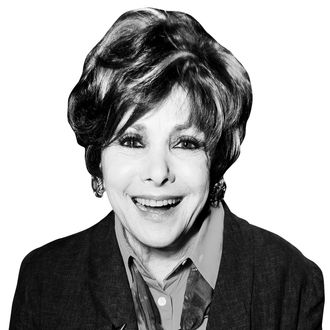
Is there too much coziness in the celebrity-journalism business?
There is a coziness in the business, and you can’t help it. Some reporter wrote about me — “Russell Crowe, on the way into the Oscars, gave Jeanne Wolf a kiss! Is she a professional or what?!” Russell Crowe is not my best friend. I’ve interviewed him a lot of times, and he said to me later, “I had to give you a kiss for good luck.” If that makes me a bad reporter, too bad. I do not lose my credentials because I’ve known people for a long time, and I’m happy when things are good for them and sad when they either die or are sick. Let’s remember, now, you’re talking to someone who’s done this for a long time. I do know a lot of people, and so there’s a mutual appreciation, or a kind of friendship … But people who are new, who haven’t learned how to ask a question or handle a situation, they can feel confused or left out.
Do people whisper in your ear a lot?
A lot. Yes. And as a reporter, you have to decide, No. 1, I’d better make sure it’s true. What’s their motive? And also, try to go to the source. All those things I’m saying, wouldn’t any reporter at your magazine say the same thing? Entertainment journalism is not so exotic. It may be more extreme than it used to be, but it’s not more exotic than it used to be.
Given the level of gossip in Hollywood, it seems staggering that the Bill Cosby story was hidden for so long.
Bill Cosby could not do, today, what Bill Cosby did. There are so many people who covered up for him and who knew. I’m not saying I did.
Do you think some reporters did?
I doubt that many reporters did. He was too cagey for that, and we were all too busy believing in his positive effect on society. Maybe some did, but for the most part, a lot of behind-the-scenes people, a lot of executives, a lot of people knew. He was making everybody so much money, and also, he was such a good symbol. When you go to a party, people whisper. “So and so knew.” “They all knew.” The cynical approach now is that a lot of people knew. I haven’t heard any reporters say, “I knew.” But they wouldn’t.
Not to point fingers, but why do you think it eluded the press for so long?
It’s for the same reason that those women didn’t report by what happened: No. 1, they were mixed up by what happened. No. 2, they were embarrassed. No. 3, he just seemed so all-powerful. Well, hardly anybody seems all-powerful anymore.
In the time you’ve been in the business, have you seen an evolution in terms of what’s considered appropriate or inappropriate to report?
An illness: somebody has dementia; somebody is very sick, and you want to give them their privacy, which is hard to maintain now, very hard to maintain. Every once in a while, you’ll see a sort of sympathetic response. “This could really hurt somebody.” Like having a troubled child. Even those kinds of secrets would be much harder to keep now. It would be very hard to expect the courtesy of someone keeping a secret that would make big news. There’s the cutthroatness and the competitiveness, and the availability of information, whether it’s gotten fairly or not.
What does it mean for information to be gotten unfairly?
Many, many hospitals have people in them that know they can make money from reporting someone who just had a baby, or someone who just died, or some celebrity’s parent who just died. We know there are paid informants, chauffeurs, catering people in restaurants: people who observe. And certainly people who get abused. If you’re a worker-person, and somebody treats you badly, you won’t even need to be paid to tell that story…
What do you think the purpose of Hollywood coverage is?
To entertain, and I guess you could say to inform, but first to entertain, and to gain readers, clickers, and ticket-buyers. And TV-watchers. It’s all about the business of selling tickets and making ratings and making clicks.
In certain kinds of journalism, people would feel uncomfortable about the notion that they were participating in promotion, or that part of their job was helping to sell things. Does that every cause you any sense of misgiving?
It may have some place along the line, but it’s how you get to people. It’s sort of a trade-off. A deal’s got to be good for everybody. If I do a good interview with this person, it may be that it helps them sell movie tickets or get their next part. I need them, they need me. Here’s when I feel funny: You’re standing on a red carpet, and you think, “I have a master’s degree! And I’m yelling, ‘Tom! Jada! Come over here! Here I am!’ ” Holding up my microphone. When you’re screaming at the top of your lungs, on the red carpet, because you want a sound bite. “Leo! Leo! Leo!” You’ll do anything for a little eye contact so the person will come over to you. Those are the moments when you think, “Is this what I’ve done with my life?” But I still wouldn’t stop it.





























